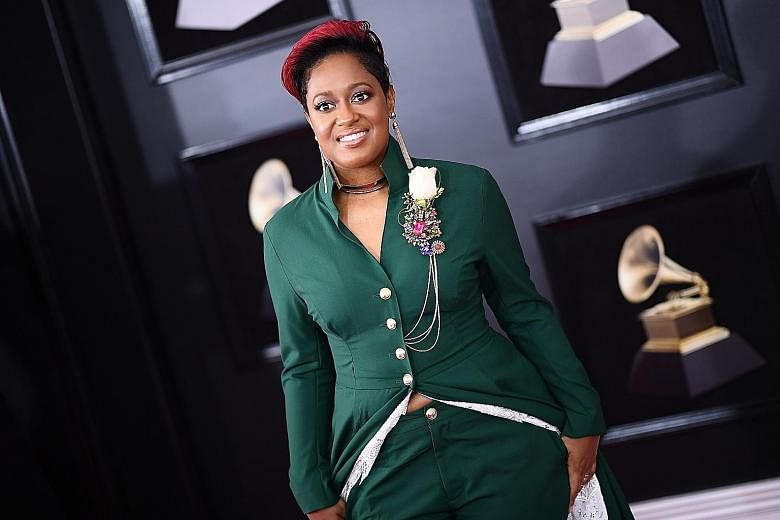LONDON • She is a self-described "tomboy" who offers a ferocious voice for the voiceless.
In January, 35-year-old Rapsody became the fifth woman to be nominated for Best Rap Album at the Grammys - for Laila's Wisdom - and she picked up a nomination for Best Rap Song too.
Loaded with intricate rhyme patterns, wordplay and metaphors, her music coolly captures the essence of black women.
At her fiercest, Rapsody - born Marlanna Evans - damningly critiques the American prison system. "I know prison business, but nobody know how many innocent in it," she raps on Nobody.
She also attacks negative perceptions of the darker-skinned. "Black and ugly as ever and still nobody fine as me/No one been as kind as me," she sings on Black & Ugly .
These are vulnerable, complex stories not being told by the likes of rappers Nicki Minaj and Cardi B, who are all braggadocio.
"I want to make music that people can feel and connect with," she said in a soothing low register before her recent sell-out show at the Jazz Cafe, London.
"I love making music that I care about and, if you listen to it, you can tell I care about my craft and people and our communities."
Growing up in Snow Hill, North Carolina, Rapsody watched pioneers MC Lyte and Queen Latifah exert their influence on television and became immersed in the art of rapping to perfectly execute untold stories.
"I just loved (rap's) freedom of expression," she said. "Whether that was the fashion, how you dance, how you walk - everyone had their own styles and we could co-exist. That was the beauty of hip-hop for me."
Initially, she added that it was "just a dream. I didn't have enough confidence to pursue (rapping). It took me going to college and having my friends push me for me to take it seriously".
In the early 2010s, Rapsody began her ascension, wielding lyrically dense odes to self-advancement and the sprawl of the black American experience.
Mainstream rap was still a landscape in which lyrical skill was secondary, for men and women.
Conscious, creative rappers such as Lupe Fiasco faced battles with their record labels and underground veterans such as Jean Grae remained exactly that: underground.
Rapsody had her own jarring experiences. "Women weren't looked at as being talented or able to compete with the men," she said.
"We were always reduced to fighting among one another. To some people, we had to prove we could rap and, to others, we had to look the part. But for what?
"What's the point? Men can co-exist and women can do the same thing. But it feels good to know that I made it this far and didn't have to compromise or change my style, how I looked, how I rapped and what I rapped about.
"My journey shows women do have something to say and you can't box us in and try to define us any more."
Rapsody also earned the respect of rap's elite - Kendrick Lamar included her on his epochal To Pimp A Butterfly album, in which she delivered a magnificent perspective on the notion of black beauty in Complexion (A Zulu Love) .
Mainstream recognition was fully realised on Laila's Wisdom, featuring Lamar and jazz virtuoso Terrace Martin, among others.
"That was the album where I said: 'I'm not worried about proving to anyone that I can rap or that I'm not worthy enough. I'm not going to waste time trying to fight for the same three million people (as) everybody else," says Rapsody, referring to the established fanbase of rap.
"I'm focusing on my lane and letting it build. I wanted to tell my story, something that spoke for black women, and not be afraid to tell the honest or ugly parts."
In an era of money, drugs and excess, Rapsody has found a meaningful pocket within the rap culture.
Although no Grammy was forthcoming, she remains determined to stand for those voices who are seldom heard.
"I remind myself that making good music and being myself got me here," she said.
"My purpose has always been to inspire and touch people and you can't hold that to an award - it's so much bigger than that."
GUARDIAN

